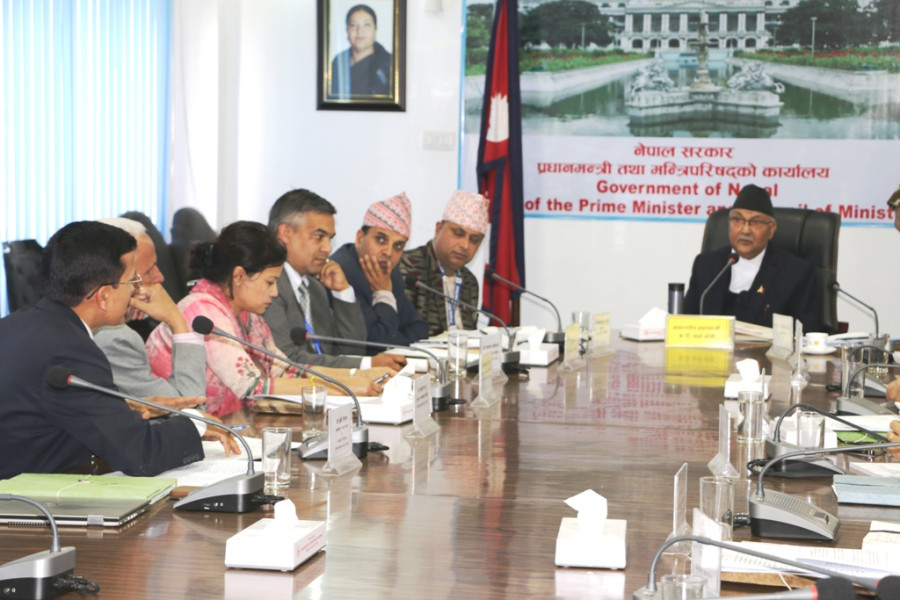National
Poverty Alleviation Fund may get new lease of life
Critics say the move will be against the spirit of federalism and could create confusion and conflict with local governments
Prithvi Man Shretsha
The government is likely to retain the Poverty Alleviation Fund, an agency formed to reduce extreme poverty through targeted programmes, despite previous decision to scrap it.
Officials told the Post that it was Prime Minister KP Sharma Oli, also the board chairman of the PAF, who wanted to keep the agency.
“The prime minister had intimated in the latest board meeting held on April 7 that the PAF will be continued,” PAF Vice-chairman Nirmal Kumar Bhattarai said. “The prime minister had also vowed to probe into the irregularities in the institution.”
The government has formed a five-member task force, headed by Sishir Dhungana, secretary at the Prime Minister’s Office, to recommend the measures to manage the PAF. A budget of Rs 50 million has also been allocated to the agency for the upcoming fiscal year 2019-20.
As per the Action Plan on Restructuring of the Poverty Alleviation Fund (PAF) approved by the Cabinet on November 11, 2018, the PAF Act should have been scrapped by mid-December 2018, dissolving the PAF as an autonomous entity.
Establishment of a separate ministry to deal with poverty, election of local and provincial governments, and discontinuation of the World Bank grant were key factors that had led to the government’s earlier decision to dissolve the PAF Meanwhile, a government official has told the Post that giving continuity to the PAF could create confusion and conflict with local governments.
“The central government should not run micro-level anti-poverty programmes which come under the jurisdiction of local governments. It will invite conflict,” said the official requesting anonymity.
Giving continuity to the PAF would also contradict the Guideline on Operation of Community Organizations and Small Infrastructure Development Programmes promoted by the PAF.
The guidelines, approved by the PAF board on April 7, has made local governments responsible to keep records of community organisations and small infrastructure projects promoted by the PAF; to facilitate community organisations to continue anti-poverty initiatives; to monitor the operation of revolving funds established at community levels; to involve community organisations in policy making of local governments and to monitor their transactions; and to launch skill development programmes.
The guideline also states that although the poverty alleviation falls under the concurrent jurisdiction of all three tiers of the government, formation of community organisations and their mobilisation comes under the jurisdiction of local governments.
The government’s plan to retain PAF comes at a time when Prime Minister Oli is facing criticisms for attempting to centralise power.
Some officials say the reason behind Prime Minister Oli’s desire to retain the PAF is politically motivated.
“The job of the government is not to make micro-level policies but to prepare macro-level strategies and coordinate with provincial and local governments to prevent duplication of programmes. Otherwise, it may be considered against the spirit of federalism,” said one official.
PAF Vice-chairman Bhattarai also suggested that the move may have been partly motivated by politics. To dissolve an anti-poverty institution is to give the opposition a political advantage, he said.
Another factor behind the government’s decision to give continuity to the PAF, according to Bhattarai, is the “success stories of anti-poverty initiatives” despite some corruption incidents in the institution’s higher-ups.
Chhabi Rijal, executive director at the PAF told the Post that the local level should be strengthened to run anti-poverty campaigns and the federal government should provide conditional grants based on headcounts of the poor people identified by local governments.
Established in 2003, the PAF operates in 62 of the 77 districts in the country.
In recent years, the PAF has come under public scrutiny after the Commission for Investigation of Abuse of Authority filed two corruption cases at the Special Court against 50 senior officials and staff of the PAF in March 2015 and April 2016.




 16.12°C Kathmandu
16.12°C Kathmandu














